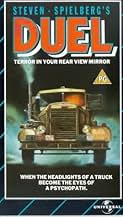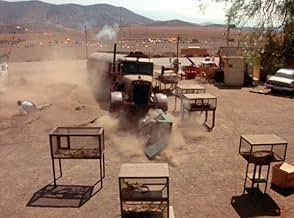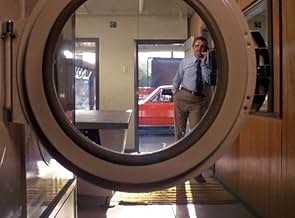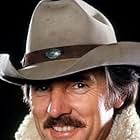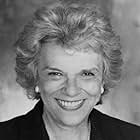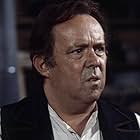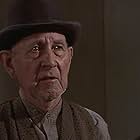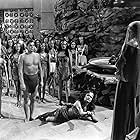A business commuter is pursued and terrorized by the malevolent driver of a massive tractor-trailer.A business commuter is pursued and terrorized by the malevolent driver of a massive tractor-trailer.A business commuter is pursued and terrorized by the malevolent driver of a massive tractor-trailer.
- Won 1 Primetime Emmy
- 3 wins & 5 nominations total
Carey Loftin
- The Truck Driver
- (as Cary Loftin)
Dale Van Sickel
- Car Driver
- (as Dale VanSickle)
Lance Cormier
- Slow Man in Cafe
- (uncredited)
Shawn Steinman
- Girl on school bus
- (uncredited)
Storyline
Did you know
- TriviaAccording to Richard Matheson, he was inspired to write the original short story "Duel" after an encounter with a tailgating truck driver on November 22, 1963, the day that John F. Kennedy was assassinated.
- GoofsWhen Mann approaches the phone booth at the "Snakerama" he says "Odd place for a telephone booth," and gets inside, closing the door behind him. The camera pans to the right slightly, revealing the reflection of Steven Spielberg in the lower right-hand side of the glass panel, wearing what appears to be a blue Hawaiian shirt, glancing up and down at the script in his hands. Behind him, the truck's reflection can also be seen.
- Quotes
David Mann: You can't beat me on the grade. You can't beat me on the grade!
- Crazy creditsA scene plays out over the credits where David Mann sits on the edge of the cliff throwing stones.
- Alternate versionsFor the German DVD release, the film was entirely redubbed.
- ConnectionsEdited into The Incredible Hulk: Never Give a Trucker an Even Break (1978)
- SoundtracksBrush Those Tears from Your Eyes
(uncredited)
Written by Al Trace (as Clem Watts), Oakley Haldeman and James Lee
Published by MCA Music (ASCAP)
Featured review
Leave it to prosemaster extraordinaire, Richard Matheson (a favorite of mine and the man Stephen King acknowledges as being his biggest influence), to come up a premise so simple yet so believable and terrifying that the viewer will never look at an eighteen-wheeler the same way ever again...and leave it to cinematic wunderkind, Stephen Spielburg, to do right by Matheson's script and win acclaim in the bargain.
Though some may argue that "Bullit", "Vanishing Point", or maybe even the original "Gone in 60 Seconds" could be called the ultimate car chase movie, "Duel" deserves this designation better because it does something none of the above films can claim. The story literally starts on the road and ends on the road. No location in the entire film is ever out of sight of the highway and, in spite of the brief conversation with the wife, virtually nothing else happens outside the highway. For David Mann (played adequately enough by Dennis Weaver) and the monster truck he's trying to get away from, the road and everything alongside it is their entire universe. Nothing else of importance exists outside of it.
Though it's never mentioned in the film, this would seem to take place on the California highways. When I went out there about eight years ago, I went down roads that seemed to be not too dissimiliar to the ones shown here. They seemed to stretch on forever, no vestiges of civilization in sight for miles. Spielburg uses this setting to great advantage. Being in your car in a crowded city intersection is one thing, but on those highways with nothing but your car and a homicidal maniac in a diesel for miles? The isolation factor that cars naturally produce jumps up a thousand percent. The radiator hose problem made me think of many other times that I had similar troubles with cars I've had. Of course, I never had someone trying to kill me at the time, but...
Anyone looking for drama, character development, or all the other elements that pseudo-critics point out as the mark of cinematic excellence are liable to be disappointed by "Duel". It's what King described in "Danse Macabre" as a Tale of the Hook. It's only purpose is to scare the hell out of you. Damn if it doesn't work. THAT'S the mark of a classic.
Though some may argue that "Bullit", "Vanishing Point", or maybe even the original "Gone in 60 Seconds" could be called the ultimate car chase movie, "Duel" deserves this designation better because it does something none of the above films can claim. The story literally starts on the road and ends on the road. No location in the entire film is ever out of sight of the highway and, in spite of the brief conversation with the wife, virtually nothing else happens outside the highway. For David Mann (played adequately enough by Dennis Weaver) and the monster truck he's trying to get away from, the road and everything alongside it is their entire universe. Nothing else of importance exists outside of it.
Though it's never mentioned in the film, this would seem to take place on the California highways. When I went out there about eight years ago, I went down roads that seemed to be not too dissimiliar to the ones shown here. They seemed to stretch on forever, no vestiges of civilization in sight for miles. Spielburg uses this setting to great advantage. Being in your car in a crowded city intersection is one thing, but on those highways with nothing but your car and a homicidal maniac in a diesel for miles? The isolation factor that cars naturally produce jumps up a thousand percent. The radiator hose problem made me think of many other times that I had similar troubles with cars I've had. Of course, I never had someone trying to kill me at the time, but...
Anyone looking for drama, character development, or all the other elements that pseudo-critics point out as the mark of cinematic excellence are liable to be disappointed by "Duel". It's what King described in "Danse Macabre" as a Tale of the Hook. It's only purpose is to scare the hell out of you. Damn if it doesn't work. THAT'S the mark of a classic.
Details
Box office
- Budget
- $450,000 (estimated)
- Gross worldwide
- $2,544
- Runtime1 hour 30 minutes
- Color
Contribute to this page
Suggest an edit or add missing content



